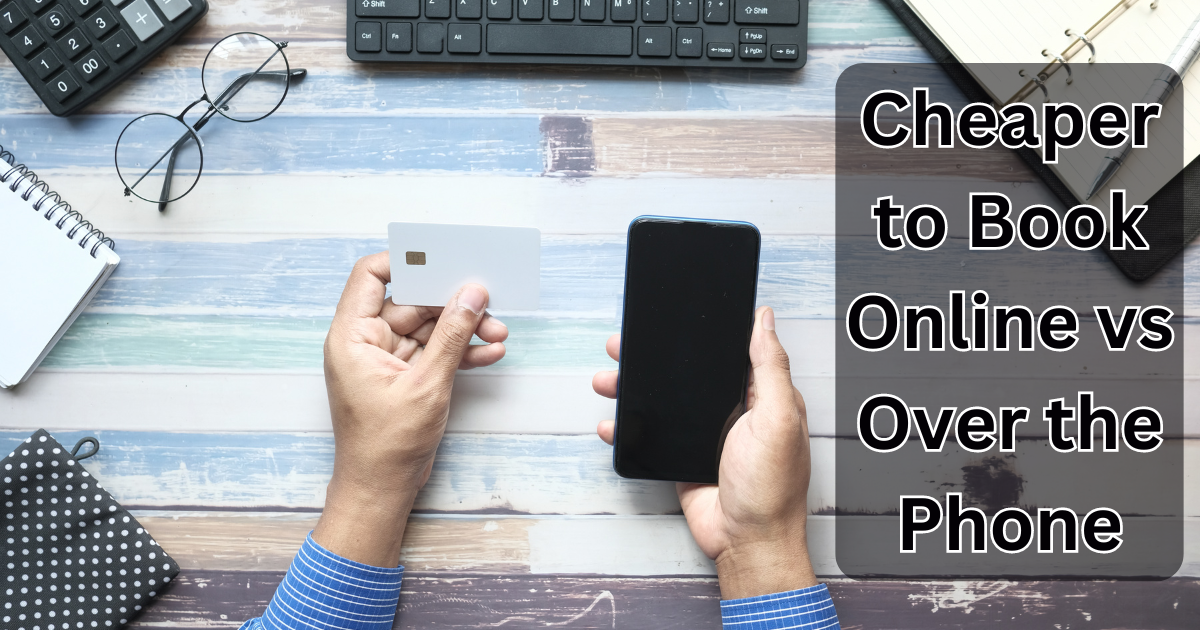In today’s digital age, booking services, whether for travel, accommodations, or events, has become more convenient than ever. The two primary methods for making reservations are online platforms and over-the-phone interactions. Many people wonder if it is cheaper to book online vs over the phone. Online booking has surged in popularity due to its accessibility and ease of use. Websites and apps allow users to compare prices, read reviews, and secure reservations with a few clicks. Conversely, phone bookings, a traditional method, offer personalized service through direct communication with an agent. This article delves into the comparison of these two booking methods, focusing on their cost-effectiveness and other factors influencing consumer choices.
The Shift to Online Bookings
The shift from phone to online bookings has been driven by technological advancements and changing consumer preferences. Online platforms offer a streamlined process that is often faster and more efficient than traditional methods. With the rise of smartphones and high-speed internet, users can now make bookings from virtually anywhere at any time. This shift has not only transformed how people book services but has also led to increased competition among providers, often resulting in better deals and discounts for online customers. However, despite these advantages, some people still prefer the personal touch of phone bookings, highlighting the ongoing debate between the two methods.
Why the Debate: Online vs Over the Phone?
The debate over whether it is cheaper to book online or over the phone stems from various factors, including cost, convenience, and customer service. Each method has its pros and cons, and the best choice often depends on individual preferences and needs. Online booking offers the convenience of immediate access and often lower prices due to reduced overhead costs for providers. On the other hand, phone bookings can provide a more personalized experience and sometimes access to exclusive deals not available online. Understanding these dynamics can help consumers make informed decisions based on their specific circumstances.
The Evolution of Booking Methods
The Traditional Method: Phone Bookings
Phone bookings have long been the standard method for making reservations. This traditional approach involves calling a service provider and speaking directly with an agent to secure a reservation. While this method allows for personal interaction and immediate assistance, it also has its drawbacks. Phone bookings can be time-consuming, especially if wait times are long or if the agent is not well-informed. Additionally, there is a risk of miscommunication, which can lead to errors in reservations. Despite these challenges, phone bookings remain popular among those who value personal service and direct communication.
Rise of Online Booking Platforms
The rise of online booking platforms has revolutionized the reservation process. Websites and mobile apps offer users the ability to browse options, compare prices, and make reservations with just a few clicks. This method has become increasingly popular due to its convenience and efficiency. Online platforms often provide access to a wide range of options, including user reviews and detailed information about services. Moreover, many online booking platforms offer special promotions and discounts that are not available through other channels. This shift to digital has made booking services more accessible and transparent for consumers.
Technological Advancements and Consumer Behavior
Technological advancements have significantly influenced consumer behavior, especially in the realm of bookings. The development of sophisticated algorithms and data analytics has allowed online platforms to offer personalized recommendations and dynamic pricing. Consumers are now accustomed to the ease of accessing information and making decisions quickly. This shift has led to a preference for online bookings, where users can instantly check availability, read reviews, and secure their reservations. As technology continues to evolve, it is expected that online booking methods will become even more integrated into daily life, further impacting consumer choices.
Cost Factors in Booking
Hidden Fees in Phone Bookings
One of the significant drawbacks of phone bookings is the potential for hidden fees. Service providers may not always disclose additional charges upfront, leading to unexpected costs at the time of booking or upon arrival. These fees can include service charges, booking fees, or taxes that are not immediately apparent. Additionally, phone bookings often require agents to manually input information, which can sometimes lead to errors or additional charges. Consumers who choose to book over the phone should be cautious and inquire about all potential fees to avoid surprises.
Online Booking Discounts and Deals
Online booking platforms often provide access to exclusive discounts and deals that are not available through other methods. Many websites and apps offer promotional codes, seasonal discounts, and special offers that can significantly reduce the cost of reservations. Additionally, online platforms frequently have partnerships with various service providers, allowing them to pass on savings to consumers. By leveraging these online discounts, users can often secure better rates than those available through traditional phone bookings. This cost advantage is a major reason why online booking has become so popular.
Comparison of Service Charges: Online vs Phone
When comparing service charges between online and phone bookings, it is essential to consider the different cost structures involved. Cheaper to book online vs over the phone often comes down to overhead costs. Online booking platforms typically have lower operational expenses, leading to reduced service charges for users. In contrast, phone bookings may incur additional costs due to the need for human agents and the potential for longer call times. Service providers might pass these costs onto consumers through higher fees or charges. Therefore, while phone bookings offer personalized service, online bookings frequently emerge as the more cost-effective choice due to their lower service charges.
Convenience: Online vs Over the Phone
Time Efficiency in Online Bookings
One of the primary advantages of online bookings is time efficiency. Users can make reservations quickly and easily from the comfort of their own homes or on the go. Online platforms allow for instant access to availability, pricing, and booking options, reducing the time spent on the reservation process. This efficiency is particularly beneficial for busy individuals who may not have the time to make phone calls and wait on hold. The ability to complete bookings in a few minutes online makes this method a preferred choice for many consumers.
Availability of Customer Support Over the Phone
While online bookings offer convenience, phone bookings provide the advantage of direct customer support. Speaking with a live agent allows for immediate assistance with any questions or concerns that may arise during the booking process. This personalized support can be valuable for complex reservations or situations requiring special accommodations. Phone bookings also allow for real-time problem resolution, which can be particularly useful if issues arise during the reservation process. For those who value personal interaction and support, phone bookings offer a distinct advantage over online methods.
User Experience: Websites vs Call Centers
The user experience between online booking websites and call centers can vary significantly. Online platforms offer a self-service approach where users navigate through various options and complete their bookings independently. This method provides a high level of control and flexibility but may lack the personal touch of direct interaction. On the other hand, call centers offer a more hands-on approach, with agents guiding users through the booking process. While this can be more time-consuming, it provides an opportunity for personalized assistance and immediate answers to questions. Each method has its benefits, and the choice between them often depends on individual preferences and needs.
Flexibility and Options
Customization Options Online
Online booking platforms often provide a range of customization options that can enhance the user experience. Many websites and apps allow users to filter search results based on specific criteria, such as price, location, or amenities. This level of customization enables users to find options that best meet their needs and preferences. Additionally, online platforms frequently offer detailed descriptions, photos, and reviews that help users make informed decisions. This flexibility in customization makes online booking a popular choice for those seeking tailored options and personalized experiences.
Limited Choices Over the Phone
Phone bookings may offer fewer customization options compared to online platforms. When booking over the phone, users typically rely on the agent to provide available options based on their preferences. This can limit the range of choices and may result in less detailed information about the services being booked. While phone agents can provide personalized recommendations, the process may not be as flexible as online platforms that allow users to explore a wide range of options independently. For those who value extensive customization, online booking may be the better choice.
Last-Minute Changes: Which is Easier?
Making last-minute changes to reservations can be more challenging with phone bookings. Contacting a live agent and negotiating changes can be time-consuming and may involve additional fees. In contrast, online platforms often provide users with the ability to manage and modify their reservations directly through their accounts. This self-service option allows for more immediate changes and updates, making it easier for users to adjust their plans as needed. The convenience of online management can be particularly advantageous for those who need to make quick adjustments to their bookings.
Also Read: Giới Thiệu Kênh 123bpros
Access to Information
Real-Time Updates and Availability Online
One of the significant benefits of online booking is access to real-time updates and availability. Online platforms provide users with up-to-date information on availability, pricing, and booking options. This immediacy allows users to make informed decisions and secure reservations based on current data. Real-time updates also help users avoid double bookings or scheduling conflicts. The transparency and accuracy of information available online contribute to a more efficient and reliable booking process.
Relying on Agent Knowledge Over the Phone
When booking over the phone, users rely on the knowledge and expertise of the agent to provide accurate information. While agents can offer personalized recommendations and answer specific questions, there is a risk of miscommunication or errors. Phone agents may not always have access to the most current information, leading to potential discrepancies in availability or pricing. As a result, users may face challenges in verifying details or ensuring that their reservations are accurate. For those who prioritize real-time information, online booking may offer a more reliable option.
Transparency in Online Reviews and Ratings
Online platforms often feature user reviews and ratings that provide valuable insights into the quality of services and accommodations. These reviews can help users make informed decisions by offering firsthand accounts of experiences from other customers. The transparency of online reviews also allows users to assess the credibility of service providers and avoid potential issues. While phone bookings do not offer this level of transparency, online reviews contribute to a more informed and confident booking process.
Price Transparency
Online Price Comparisons
Online booking platforms frequently offer price comparison tools that enable users to compare rates across multiple providers. This feature allows users to find the best deals and make cost-effective decisions, highlighting why it is often cheaper to book online vs over the phone. By comparing prices online, users can identify discounts, promotions, and special offers that may not be available through other channels. Price comparison tools also help users avoid overpaying and ensure that they are getting the best value for their money. The ability to compare prices online is a significant advantage for those seeking to maximize their savings.
Lack of Clarity in Phone Quotes
Phone bookings may lack the clarity of pricing that online platforms provide. When booking over the phone, users often receive quotes from agents that may not include all potential fees or charges. This lack of transparency can lead to confusion and unexpected costs. Additionally, phone quotes may be subject to change based on availability or other factors, making it difficult for users to verify the final price. For those who prioritize clear and upfront pricing, online booking may offer a more transparent option.
Price Matching: Online vs Phone Offers
Price matching is a common practice among service providers, but its availability can vary between online and phone bookings. Online platforms may offer price matching guarantees or promotions that allow users to receive the best rate available. Phone bookings may also offer price matching, but it often requires negotiation with the agent and may not be as straightforward. The ease of price matching online can be advantageous for users seeking to secure the best deal without extensive effort.
Promotions and Special Offers
Exclusive Online Promotions
Many online booking platforms offer exclusive promotions and discounts that are not available through other channels. These online promotions can include limited-time offers, seasonal deals, and special discounts for first-time users. Online platforms often partner with service providers to offer these deals, making them accessible to users who book through their websites or apps. The availability of exclusive promotions online provides an additional incentive for users to choose this method over phone bookings.
Phone-Only Offers: Are They Real?
Phone-only offers are sometimes marketed as exclusive deals available only through direct communication with an agent. While these offers can be legitimate, they may not always provide the best value compared to online promotions. Phone-only offers can also be challenging to verify, as users may not have access to the same level of information and transparency as online platforms. To determine the validity of phone-only offers, users should carefully inquire about the details and compare them with online options.
Seasonal Deals: Online vs Phone
Seasonal deals are common in the booking industry and can significantly impact pricing. Online platforms often feature seasonal promotions that align with holidays, events, or travel trends. These deals may include discounts, package offers, or special rates for specific dates. Phone bookings may also offer seasonal deals, but they may not always be as prominently advertised or accessible as online promotions. Users seeking seasonal savings should explore both online and phone options to ensure they are getting the best available deal.
Security Concerns
Data Privacy in Online Transactions
Online bookings involve the transmission of sensitive information, such as payment details and personal data. As a result, data privacy and security are critical considerations. Reputable online booking platforms implement robust security measures to protect user information, including encryption and secure payment gateways. However, users should also be vigilant and choose platforms with strong security credentials. Ensuring that online transactions are conducted through secure channels can help mitigate the risk of data breaches and fraud.
Risks Associated with Phone Transactions
Phone transactions can also pose security risks, particularly if sensitive information is shared over unsecured lines. Scammers and fraudsters may attempt to obtain personal details through phone calls, leading to potential identity theft or financial loss. To reduce these risks, users should verify the legitimacy of the service provider before sharing any personal information over the phone. Additionally, using secure payment methods and avoiding unsolicited calls can help protect against phone-based scams.
Safe Practices for Both Methods
Regardless of the booking method, it is essential to follow safe practices to protect personal and financial information. For online bookings, users should ensure that websites are secure, use strong passwords, and monitor their accounts for suspicious activity. For phone bookings, verifying the identity of the service provider and avoiding sharing sensitive information unless necessary can help prevent fraud. By adhering to these safety measures, users can confidently navigate both online and phone booking methods.
Customer Satisfaction
User Feedback on Online Booking Experiences
User feedback on online booking experiences is generally positive, with many users appreciating the convenience and efficiency of this method. Online reviews and ratings often highlight the ease of navigating booking platforms, accessing information, and securing reservations quickly. The ability to compare options and read reviews from other customers contributes to a more informed and satisfactory booking experience. However, some users may also report challenges, such as website glitches or difficulties with customer service.
Customer Service Quality Over the Phone
Customer service quality over the phone can vary depending on the service provider and the individual agent. While phone bookings offer personalized assistance, the quality of service can be inconsistent. Users may encounter long wait times, unhelpful agents, or miscommunications that impact their overall satisfaction. On the other hand, effective phone support can enhance the booking experience by providing immediate assistance and addressing specific needs. The level of customer service experienced over the phone often plays a significant role in determining user satisfaction.
Resolving Issues: Online vs Phone
Resolving issues with reservations can differ between online and phone methods. Online platforms typically offer self-service options for managing and resolving issues, such as modifying bookings or requesting refunds. This convenience allows users to address problems directly through their accounts. Phone bookings may require additional effort to resolve issues, as users must contact customer service and provide necessary details. While phone support can offer personalized assistance, the process may be more time-consuming compared to online resolution methods.
Impact of COVID-19 on Booking Preferences
Surge in Online Bookings During the Pandemic
The COVID-19 pandemic significantly impacted booking preferences, leading to a surge in online bookings. Lockdowns, social distancing measures, and travel restrictions prompted consumers to seek contactless and remote booking options. Online platforms offered a safe and convenient way to make reservations without physical interactions, often proving to be cheaper to book online vs over the phone. This shift to online bookings was driven by the need for flexibility, accessibility, and safety during the pandemic. As a result, many consumers have continued to favor online methods even as restrictions have eased.
Reduced Phone Services: A Necessity or a Trend?
During the pandemic, many service providers reduced phone services to limit in-person interactions and manage increased demand. This reduction led to longer wait times, limited availability, and challenges in accessing phone-based support. While some users appreciated the shift to online methods, others faced difficulties in obtaining assistance through traditional phone channels. The reduction in phone services has raised questions about whether it is a temporary necessity or a long-term trend in the industry.
Post-Pandemic Booking Trends
Post-pandemic booking trends indicate a continued preference for online methods, driven by the convenience and efficiency they offer. While phone bookings have not disappeared, many consumers have embraced the benefits of online platforms, such as real-time updates and self-service options. The pandemic has accelerated the adoption of digital solutions and highlighted the advantages of online bookings. As the world adjusts to a new normal, online booking methods are likely to remain a dominant choice for consumers seeking flexibility and ease.
Environmental Impact
Paperless Transactions: The Online Advantage
Online bookings contribute to environmental sustainability by eliminating the need for paper-based transactions. Digital confirmations, receipts, and documents reduce paper waste and minimize the environmental footprint of the booking process. Online platforms often provide electronic communication and documentation, aligning with eco-friendly practices. By choosing online bookings, consumers can support efforts to reduce paper consumption and contribute to a more sustainable future.
Phone Bookings and Environmental Footprint
Phone bookings may have a larger environmental footprint compared to online methods due to the need for paper-based documentation and potential waste from physical mailings. Additionally, phone calls contribute to energy consumption and greenhouse gas emissions associated with telecommunications. While the environmental impact of phone bookings may be less visible, it is essential to consider the broader implications of traditional booking methods. Online bookings offer a more sustainable alternative by minimizing the use of physical resources.
Sustainable Practices in Booking Methods
Both online and phone booking methods can adopt sustainable practices to reduce their environmental impact. For online bookings, platforms can implement digital-only communication and encourage users to opt for electronic receipts. Phone booking services can also reduce their environmental footprint by minimizing paper use and adopting eco-friendly practices in their operations. By promoting sustainability and incorporating environmentally conscious practices, the booking industry can contribute to a greener future.
Personalization in Bookings
Tailored Suggestions Online
Online booking platforms often use algorithms and data analytics to provide tailored suggestions based on user preferences and past behavior. These personalized recommendations can enhance the booking experience by offering relevant options and targeted promotions. Users can benefit from customized suggestions that align with their preferences, making it easier to find and secure the best options. The ability to receive personalized recommendations online adds a layer of convenience and relevance to the booking process.
Personalized Service Over the Phone
Phone bookings offer a level of personalization through direct interaction with a live agent. Agents can provide individualized recommendations and address specific needs or preferences based on the user’s input. This personal touch can be valuable for users seeking customized service and assistance. While phone bookings offer a more personal approach, they may not always provide the same level of tailored suggestions as online platforms. The choice between online and phone personalization depends on the user’s preference for technology-driven or human-centered service.
Balancing Personalization and Convenience
Balancing personalization and convenience is key to optimizing the booking experience. Online platforms provide automated personalization through data analysis, while phone bookings offer human interaction and customized service. Users may prioritize one approach over the other based on their preferences and needs. Combining the strengths of both methods can enhance the overall booking experience, providing users with personalized options and convenient solutions. Understanding individual preferences and selecting the appropriate booking method can lead to a more satisfying experience.
Future Trends in Booking Methods
Emerging Technologies in Online Booking
The future of online booking methods is likely to be shaped by emerging technologies such as artificial intelligence (AI), machine learning, and virtual reality (VR). AI-driven chatbots and virtual assistants can enhance the booking experience by providing instant support and personalized recommendations. Machine learning algorithms can further refine suggestions and improve accuracy. VR technology may offer immersive booking experiences, allowing users to explore options virtually before making a decision. These technological advancements have the potential to revolutionize the booking industry and offer innovative solutions for users.
Innovations in Phone Booking Systems
Phone booking systems are also evolving with advancements in technology. Interactive voice response (IVR) systems and automated phone services can streamline the booking process and reduce wait times. Integration with customer relationship management (CRM) systems can enhance the personalization of phone-based service. Innovations in phone booking systems aim to improve efficiency and user satisfaction, providing a more seamless experience for those who prefer traditional methods. The integration of technology into phone bookings reflects the industry’s effort to adapt to changing user preferences.
The Future of Booking: Hybrid Models
Hybrid booking models that combine online and phone methods may become increasingly popular in the future. These models offer users the flexibility to choose between digital and traditional approaches based on their preferences and needs. For example, users may start the booking process online and complete it with a phone call for personalized assistance. Hybrid models can provide the best of both worlds, catering to diverse user preferences and enhancing the overall booking experience. The evolution of booking methods will likely involve a blend of technological innovation and personalized service.
Conclusion
Choosing between booking online or over the phone involves balancing convenience, cost, and personal interaction. When considering if it is cheaper to book online vs over the phone, online booking often offers greater ease of access, price transparency, and exclusive deals, making it ideal for users seeking efficiency and cost savings. On the other hand, phone bookings provide personalized service and direct communication, which can be valuable for those needing tailored assistance. As technology advances and user preferences evolve, the booking process continues to adapt. By understanding the strengths and limitations of each method, users can make informed decisions that best suit their individual needs and ensure a satisfying booking experience.










